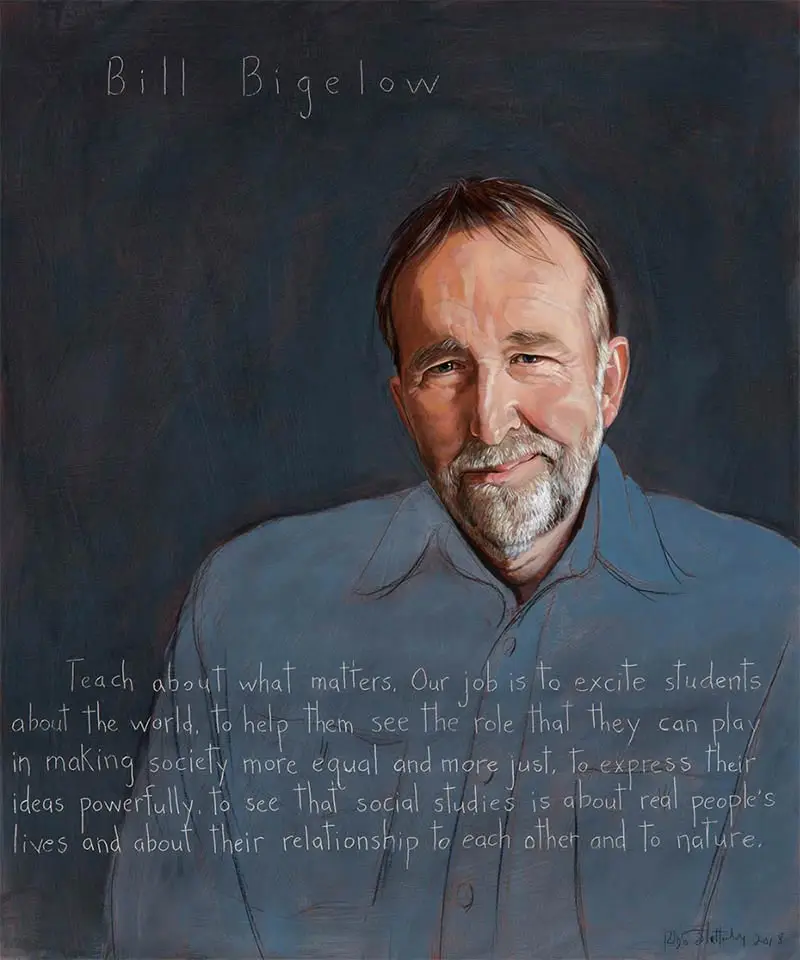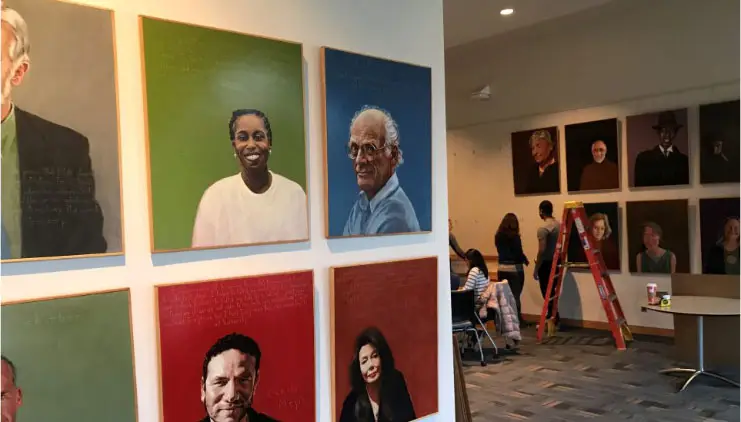
Bill Bigelow
Bill Bigelow
Educator : 1951
“Teach about what matters. Our job is to excite students about the world, to help them see the role that they can play in making society more equal and more just, to express their ideas powerfully, to see that social studies is about real people’s lives and about their relationship to each other and to nature.”
Speaking Truth to Youth
Educator Bill Bigelow highlights for youth activists the significance of the journey and the value of community.
Biography
Retired social studies teacher
Curriculum Editor of Rethinking Schools magazine
Co-director of the Zinn Education Project
Author and editor of many innovative school curricula (e.g. history, environment, globalization, justice)
People have always said that history’s “winners” are the ones who get to write the story. Though that has often been true, the “winners” can’t erase all the documents and memories that shape different, more historically accurate and complete interpretations of what happened in the world.
When one looks at the written history produced prior to the middle 20th century, one finds a steady stream of political, military and economic histories that emphasize the lives and actions of “great [white] men,” though there were occasions when “great [white] women” simply could not be ignored. Most of the writers and teachers of U.S. history accepted these narratives as the sum of our history. Even with the rise of social history, which focused on the experiences of more ordinary and diverse people, it has remained difficult to avoid that classic “great man” construct.
Bill Bigelow has made it his mission to change how history is taught and how students engage historical material, while teaching more honestly about the historic realities that shape the United States. As he has noted, “[t]eaching students a deeper, more complete history . . . is not just a matter of accuracy, it’s about life and death.”
Bigelow earned his bachelor’s degree from Ohio’s Antioch College, and his master’s degree from Reed College in Portland, Oregon, before going into teaching. Now a retired social studies teacher, Bigelow is the Curriculum Editor of Rethinking Schools magazine and the Co-Director of the Zinn Education Project (which is named for the late, eminent historian Howard Zinn). Bigelow has written and co-edited a wide range of curricula, including, Rethinking Our Classrooms: Teaching for Equity and Justice (volumes 1 and 2); Rethinking Columbus: The Next 500 Years; Rethinking Globalization: Teaching for Justice in an Unjust World; and A People’s Curriculum for the Earth: Teaching About the Environmental Crisis. He is the author of Strangers in Their Own Country: A Curriculum Guide on South Africa; The Power in Our Hands: A Curriculum on the History of Work and Workers in the United States; The Line Between Us: Teaching About the Border and Mexican Immigration; and A People’s History for the Classroom.
During his tenure as a teacher, Bigelow used role playing as an essential tool to spark student interest in both history and critical thinking. Bigelow wanted his students “to see that history is not just a jumble of dead facts lying on a page. History is the product of human choice – albeit in conditions that we may not choose.”
Using Christopher Columbus as an example, Bigelow notes that “[f]or many youngsters the tale of Columbus introduces them to a history of this country, even to history itself.” He points out that “[t]he ‘discovery of America’ is children’s first curricular exposure to the encounter between two races. As such, a study of Columbus is really a study about us, how we think about each other, our country, and our relations with people around the world.” Through role playing, Bigelow not only introduced his students to the Taino people, the original inhabitants of the land that Columbus “discovered;” also, the students were able to consider the “discovery” and the arrival of Columbus from the perspectives of the Taino. Bigelow reminds his students that “from the moment Columbus arrived in the Americas and claimed a land he knew was occupied by other people, and announced that these people were intelligent, and hence would make good slaves, . . . racism would be an enormous factor in determining what went on here.”
The Rethinking Schools platform has allowed Bigelow to reach teachers and students beyond a single classroom or school. He is helping to change our traditional understanding of the “Age of Discovery.”
Recognizing the critical importance of addressing climate change, Bigelow has been working diligently to change the dominant teaching, or lack thereof, of climate change within our schools. He notes that he had been “‘greening’ [his] U.S. history curriculum, and [looking] for how the roots to today’s ecological crises can be found in cultural patterns that we can recognize from the very beginning of Europeans’ presence [in what became the United States].”
As he works to “green” U.S. history curricula, Bigelow notes that climate change “. . . is the greatest crisis facing humanity and we need to be alerting students and getting them to think critically about what has created the crisis and who is benefitting from it, and who has an interest in our not doing anything about it.” In 2011, Bigelow successfully lobbied the publishing giant Scholastic to cease including an American Coal Foundation pamphlet in the curricular materials the company provided to elementary school teachers; the pamphlet had a particularly strong pro-coal industry bias.
In 2016, Bigelow helped to lead an effort that resulted in Portland, Oregon requiring its public schools to stop using textbooks that question or equivocate about the reality of climate change and the fact that human activity has been its principal cause. Recognizing that Portland’s climate justice resolution will not be enough to force textbook publishers to produce new books, Bigelow expressed a hope that teachers no longer will “look to conventional sources of curriculum to educate our students about the causes of climate change [or] the kind of fundamental social transformation needed to address the crisis.”
Bigelow’s efforts to improve curricula, and to help more students engage in critical thinking not only about our historical past, but also about our present, should serve as a reminder of the important roles that teachers play in our lives. But, as Bigelow noted, “[t]eachers have been portrayed as the problem and the obstacle to student learning. It’s just ridiculous. It is a hateful time in many respects for teachers.”
Our society expects so much of teachers, but often refuses to allow them to practice their craft. Ultimately, Bigelow is right in recognizing that “[t]eachers are the ones who [can turn schools into] imaginative and creative and loving and participatory places. . . .” Bigelow has led by his example, and his students and fellow teachers benefit greatly from the important work that he is doing to change how we teach and understand our shared past.
Programs
Americans Who Tell the Truth (AWTT) offers a variety of ways to engage with its portraits and portrait subjects. Host an exhibit, use our free lesson plans and educational programs, or engage with a member of the AWTT team or portrait subjects.

Education
AWTT has educational materials and lesson plans that ask students to grapple with truth, justice, and freedom.

Exhibits & Community Engagement
AWTT encourages community engagement programs and exhibits accompanied by public events that stimulate dialogue around citizenship, education, and activism.